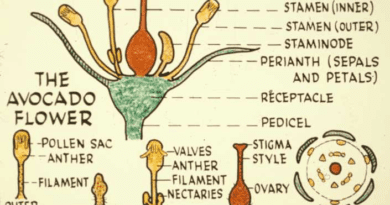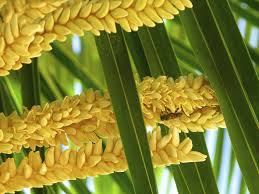The Sugarcane Seeds: Economic Importance, Uses, and By-Products
Sugarcane seeds are a fundamental element in the propagation and cultivation of sugarcane, one of the world’s most important crops. Despite sugarcane being primarily propagated through vegetative means such as stem cuttings, seeds play a crucial role in breeding programs aimed at developing new cultivars with desirable traits.
These seeds are produced through the sexual reproduction of sugarcane plants, involving the fertilization of ovules within the flower by pollen grains.
The process of obtaining sugarcane seeds begins with the flowering of mature sugarcane plants. Under suitable environmental conditions, sugarcane plants produce flowering stalks, known as inflorescences, which bear flowers containing both male and female reproductive organs.
Pollination, typically facilitated by wind or pollinators like bees, allows pollen grains to land on the stigma of the flower, leading to fertilization and seed development.
Once fertilization occurs, the ovules within the ovary of the flower develop into seeds. Sugarcane seeds are relatively small and are typically enclosed within the ovary or fruit of the flower. These seeds contain the genetic material necessary for the development of new sugarcane plants with a combination of traits inherited from both parent plants.
While sugarcane seeds are vital for breeding programs aimed at developing improved cultivars, they are not commonly used for commercial sugarcane production. This is because sugarcane is predominantly propagated vegetatively, using stem cuttings from established plants, which ensures the preservation of desired traits and uniformity in commercial fields.
However, sugarcane seeds are invaluable for introducing genetic diversity into breeding programs, enabling the development of cultivars with enhanced traits such as yield, disease resistance, and adaptability to different growing conditions.
Sugarcane seeds are essential for breeding programs focused on developing improved cultivars of sugarcane. While not commonly used in commercial production, they serve as a valuable resource for introducing genetic diversity and enhancing the resilience and productivity of sugarcane crops.
Through careful selection and breeding, sugarcane seeds contribute to the ongoing improvement of this vital crop, ensuring its continued success in meeting global demand for sugar and bioenergy.
Economic Importance and Uses of Sugarcane Seeds

1. Sugar Production: Sugarcane seeds are crucial for the cultivation of sugar-producing plants. The seeds ensure a consistent supply of sugarcane, a primary source of sugar worldwide.
2. Ethanol Production: Sugarcane seeds are utilized for ethanol production, a renewable fuel source. The seeds enable the cultivation of high-yielding sugarcane varieties optimized for ethanol production.
3. Animal Feed: Sugarcane seeds can be processed into nutritious animal feed, providing essential nutrients for livestock such as cattle and goats.
4. Bioplastics: Sugarcane seeds contribute to the production of bioplastics, eco-friendly alternatives to traditional plastics derived from petroleum.
5. Biofuel: Sugarcane seeds are used in the production of biofuels, offering a sustainable energy solution with reduced environmental impact compared to fossil fuels.
6. Molasses: Sugarcane seeds yield molasses, a by-product used in various industries, including food processing and fermentation.
7. Fertilizer: Sugarcane seeds can be processed into organic fertilizers, enriching soil fertility and promoting sustainable agriculture practices.
8. Paper Production: Sugarcane seeds are utilized in paper production, offering a renewable source of fiber for manufacturing paper products.
9. Distillery Products: Sugarcane seeds are essential for the production of distillery products such as rum and whiskey, adding flavor and character to alcoholic beverages.
10. Pharmaceutical Industry: Sugarcane seeds contain compounds with medicinal properties, utilized in the pharmaceutical industry for the production of drugs and supplements.
11. Biogas Production: Sugarcane seeds are utilized in biogas production, providing a renewable source of energy through anaerobic digestion.
12. Cosmetics: Sugarcane seeds are used in the cosmetics industry for the production of skincare products, leveraging their natural properties for moisturizing and nourishing the skin.
13. Textile Industry: Sugarcane seeds are utilized in the textile industry for the production of sustainable fabrics such as bamboo and modal, offering eco-friendly alternatives to conventional textiles.
14. Soil Erosion Control: Sugarcane seeds are utilized in soil erosion control measures, with their extensive root systems helping to stabilize soil and prevent erosion.
15. Biopesticides: Sugarcane seeds contain compounds with insecticidal properties, utilized in the production of biopesticides for pest management in agriculture.
16. Green Building Materials: Sugarcane seeds are utilized in the production of green building materials such as biocomposites and bamboo flooring, offering sustainable alternatives to traditional construction materials.
17. Land Reclamation: Sugarcane seeds are utilized in land reclamation projects, restoring degraded land and promoting environmental sustainability.
18. Soil Amendment: Sugarcane seeds are used as soil amendments, improving soil structure and fertility for enhanced crop productivity.
19. Renewable Energy: Sugarcane seeds play a crucial role in renewable energy production, contributing to the development of sustainable energy sources such as biomass power plants.
Read Also: 15 Medicinal Health Benefits Of Argyreia Nervosa (Hawaiian Baby Woodrose)
The Products and By-products That Can Be Derived From Sugarcane Seeds

1. Sugar: Sugarcane seeds are primarily used for sugar production, yielding sucrose through processing.
2. Ethanol: Sugarcane seeds are processed to extract ethanol, a renewable fuel used in transportation and industrial applications.
3. Bagasse: Sugarcane seeds yield bagasse, a fibrous by-product used as a biofuel and in the production of paper and building materials.
4. Molasses: Sugarcane seeds produce molasses, a by-product used in the production of rum, confectionery, and animal feed.
5. Bioethanol: Sugarcane seeds are utilized for bioethanol production, offering a sustainable alternative to fossil fuels in the automotive industry.
6. Biogas: Sugarcane seeds can be used to produce biogas through anaerobic digestion, providing a renewable source of energy for heating and electricity generation.
7. Bioelectricity: Sugarcane seeds are utilized in bioelectricity generation, powering homes and industries with clean and renewable energy.
8. Sugarcane Syrup: Sugarcane seeds yield sugarcane syrup, a sweetening agent used in food and beverage production.
9. Cellulose: Sugarcane seeds contain cellulose, a versatile biopolymer used in the production of textiles, paper, and bio-based materials.
10. Sugarcane Wax: Sugarcane seeds produce wax, used in the production of candles, polishes, and cosmetics.
11. Sugarcane Fiber: Sugarcane seeds yield fiber, used in the production of biodegradable packaging materials and textiles.
12. Biofertilizer: Sugarcane seeds can be processed into biofertilizers, enriching soil fertility and promoting sustainable agriculture practices.
13. Sugarcane Vinegar: Sugarcane seeds are used to produce sugarcane vinegar, a condiment used in cooking and food preservation.
14. Sugarcane Juice: Sugarcane seeds yield sugarcane juice, a refreshing beverage consumed worldwide.
15. Sugarcane Molasses: Sugarcane seeds produce molasses, a sweet syrup used in baking, brewing, and confectionery.
16. Sugarcane Bagasse Products: Sugarcane seeds yield bagasse products such as plates, cups, and packaging materials, offering eco-friendly alternatives to plastic.
Read Also: The Cocoa/Cacao Filaments: Economic Importance, Uses, and By-Products
Frequently Asked Questions (FAQs) About Sugarcane Seeds

1. What are Sugarcane Seeds?
Sugarcane seeds are the reproductive units of the sugarcane plant, containing genetic material essential for cultivation.
2. How are Sugarcane Seeds Used in Agriculture?
Sugarcane seeds are used in agriculture for the propagation of sugarcane plants, which are cultivated for sugar, ethanol, and other products.
3. Are Sugarcane Seeds Genetically Modified?
Some varieties of sugarcane seeds are genetically modified to enhance traits such as disease resistance and yield.
4. What Environmental Benefits Do Sugarcane Seeds Offer?
Sugarcane seeds contribute to environmental sustainability by promoting renewable energy production, soil conservation, and carbon sequestration.
5. Are Sugarcane Seeds Edible?
Sugarcane seeds themselves are not edible, but sugarcane stalks produced from the seeds are processed to extract sugar and other valuable products.
6. How Long Does it Take for Sugarcane Seeds to Germinate?
Sugarcane seeds typically germinate within two to four weeks under favorable growing conditions.
7. What Factors Influence Sugarcane Seed Germination?
Sugarcane seed germination is influenced by factors such as temperature, moisture, soil quality, and seed viability.
8. Can Sugarcane Seeds Be Stored for Long Periods?
Sugarcane seeds can be stored under proper conditions for several months, but their viability may decline over time.
9. How Do Farmers Obtain Sugarcane Seeds for Planting?
Farmers obtain sugarcane seeds from reputable suppliers specializing in seed production and distribution.
10. What Are the Main Challenges in Sugarcane Seed Production?
Challenges in sugarcane seed production include disease management, maintaining seed quality, and ensuring genetic diversity.
11. What Are the Nutritional Benefits of Sugarcane Seeds?
Sugarcane seeds are not consumed directly, but sugarcane products derived from the seeds, such as juice and molasses, may offer nutritional benefits.
12. Can Sugarcane Seeds Be Used for Propagation in Home Gardening?
While sugarcane seeds can be used for propagation, they are primarily utilized in commercial agriculture due to the scale of sugarcane cultivation.
13. How Do Sugarcane Seeds Contribute to Sustainable Development?
Sugarcane seeds contribute to sustainable development by supporting renewable energy production, reducing greenhouse gas emissions, and promoting agricultural sustainability.
14. What Are the Different Varieties of Sugarcane Seeds Available?
There are numerous varieties of sugarcane seeds available, each with specific characteristics suited to different growing conditions and end uses.
15. What Are the Environmental Impacts of Sugarcane Seed Cultivation?
Sugarcane seed cultivation can have environmental impacts such as habitat loss, water usage, and pesticide runoff, but sustainable practices can mitigate these effects.
16. How Are Sugarcane Seeds Processed into Commercial Products?
Sugarcane seeds are processed into commercial products through various methods such as milling, extraction, fermentation, and refining.
17. Are Sugarcane Seeds Regulated by Agricultural Authorities?
Sugarcane seeds may be subject to regulations and quality standards enforced by agricultural authorities to ensure seed quality, safety, and traceability.
18. What Are the Future Prospects for Sugarcane Seed Cultivation?
The future of sugarcane seed cultivation holds promise for innovation in genetic engineering, sustainable farming practices, and diversification of end products.
Read Also: The Different Types of Fertilizers and How they Work









